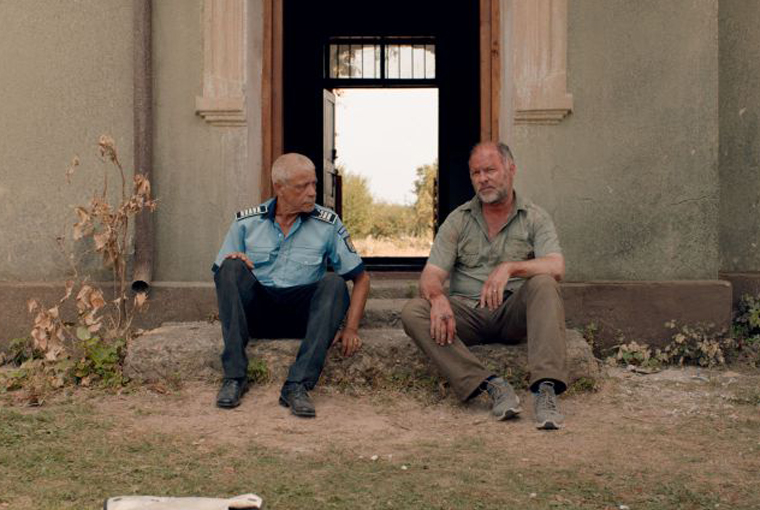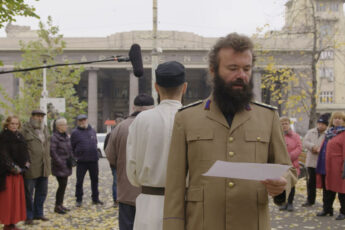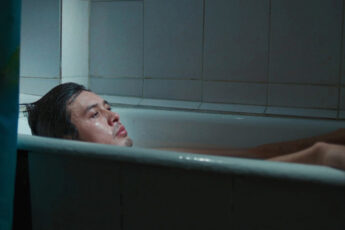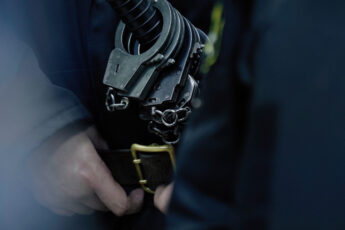Waking Sleeping Dogs in the Romanian Hinterland
Bogdan Mirică’s Dogs (Câini, 2016)
Vol. 66 (Summer 2016) by Zoe Aiano
Like a parallel universe Blue Velvet, Dogs opens with a long take scrutinizing the grassland of Romania from close up. As the camera cautiously wends its way, we reach a pond, covered in luminous green sludge and emitting periodic ominous bubbles. Eventually, the bubbles reveal their secret – a submerged stagnant lump of flesh – perfectly setting the scene and tone for the movie that marks Bodgan Mirica’s transition from screenwriter to director. Something is festering underneath the surface.
The film essentially follows two storylines, which start independently but come to interconnect, both concerned with the disruption of a tenuous status quo, like two stones casting ripples in the same pond. Roman (Dragoş Bucur), a young man from the city, inherits swathes of unfarmed land in the Romanian wilds from his grandfather, known as Uncle Alecu, out of respect, as well as fear. In making his decision about what to do with the land he must face up to his grandfather’s shady past and the related, illicit activities that still take place. Meanwhile, Hogas (Gheorghe Visu), the aging and infirm local police chief, sets out to solve the mystery of the object from the opening shot, which turns out to be a foot presumably severed from its body by the work of pigs’ teeth.
From the outset, the film is charged with the tension of the unspoken and unspeakable that lurks in the wild and sparse countryside, which feels claustrophobic and oppressive despite all the open space. Roman is clearly uneasy in his new domain, and with good cause. Why would a house in the middle of nowhere need heavy barbed wire and a fierce dog as protection? The canine in question is an aggressive, mangy looking mongrel who is amusingly but significantly named “Police.” She refuses to acknowledge Roman as her new master and remains defiantly unresponsive to his commands. Around the local men, however, she is placid and obedient, a detail that not only encapsulates the power structure in place but goes on to play a crucial role in the final showdown. Moreover, her constant barking adds an acoustic dimension to the film’s fraught atmosphere and a reminder that there’s something out there in the wastelands, with rumbling cars and suspicious lights meeting in the depths of the night. Either out of a display of bravado or a desire to rid himself of his grandfather’s tainted legacy, Roman decides to press on with the sale of the land, incurring increasingly violent threats to himself and those around him.
Meanwhile, Hogas proves himself to be a worthy addition to cinema’s long line of idiosyncratic middle-of-nowhere police chiefs, one of the many features of the film that inevitably brings the Coen Brothers to mind as a point of comparison (the combination of ineffectual rural cops, body parts and animals also suggests parallels with Dumont’s P’tit Quinquin). After years of turning an institutional blind eye during the reign of Uncle Alecu, the discovery of the foot (which he dutifully carries around in a cool box for the rest of the movie) and his impending demise from cancer inspires Hogas to finally take a stand and attempt to take down Alecu’s successor, Samir (Vlad Ivanov), a man highly skilled in the art of intimidation through friendliness.
Dogs functions very successfully through several prisms. Most obviously, it represents an interesting and engaging variation on the Western theme. All the ingredients are there – the trope of the greenhorn city boy struggling to hold his own in hostile territory of the outlands, the figure of the weather-beaten sheriff struggling with his conscience, and the culminating stand-off. Although each of the characters stands to gain from the land financially, testosterone is the true driving force of the film, which is drenched in masculinity. Mirică maintains a deft balance between this exploration of atavistic aggression and the momentum of the plot, which unfurls in a concise, well-paced manner, maintaining interest until the end. This is also helped by the dialogue, which combines pithy humor with moments of awkwardness that allow the bodily element of the actors’ performances to shine through, while also preventing the film from drifting too far out of the realm of realism and into absurdism. (On another level, the story could also be interpreted allegorically, as a depiction of a young generation that must decide whether to perpetuate the shady status quo of its forefathers or face the inevitably tumultuous consequences of upsetting it.)
But the film is also overly neat and too pristinely structured. While engaging and very watchable on screen, the characters sometimes seem to be purely serving the storyline. This is especially true of Roman’s girlfriend (Raluca Aprodu), who stands out as a character seemingly forced into the plot either as an attempt to pacify inevitable complaints about the lack of women, or, more cynically, as an excuse to include a pretty girl. Rather than having any defining characteristics of her own, she casts some dim light on the psychology of the male lead and serves as a convenient plot point towards the end. The symbolism could also stand to be handled with a lighter touch at some points, with the explanations of the titular dogs often feeling like they’ve been underlined and highlighted. That said, Dogs is an impressive first feature with benefits that definitely outweigh its flaws, including several very striking scenes. It shows a great deal of talent and much promise for Mirică’s future work, and above all makes for an enjoyable and gripping viewing experience.




Leave a Comment